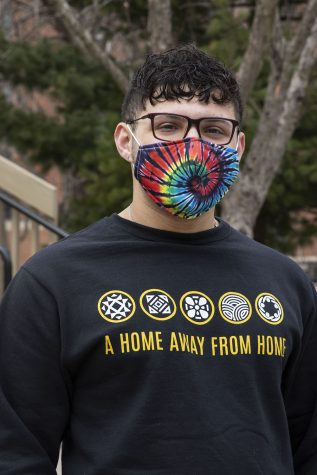Joseph Villalobos
As Joseph Villalobos transitioned to college, he became more immersed in one identity — but felt further away from another.

A native of Elgin, Illinois, a town that is about 80 percent Latinx, Villalobos said he decided to attend the University of Iowa after a former teacher recommended its English program.
“She also told me that it is like the gay center of Iowa — Iowa City,” Villalobos said.
A reality the sophomore soon realized, Villalobos said. Before coming to the UI, he said he didn’t know many people with queer identities in Elgin, only about two.
“And I was like, ‘Wow, there are so many people here who are queer and out and proud,’” Villalobos said. “And it’s a cool environment to be in.”
At the same time, Villalobos said he still felt a sense of “otherness,” in his classrooms, mostly because of his Puerto Rican identity.
“It’s a little weird for me to be in classes and to have like this — not language barrier — but thought barrier,” Villalobos said.
Things that translate into his queer identity, though, Villalobos said, have helped him find similarities and struggles with people who come from different worlds.
“While I didn’t have that same ethnic similarity,” Villalobos said, “I had a new thing to connect with, a new identity.”
This environment is a big part of his work with the UI Pride House as a center programming assistant, Villalobos said. But virtual programming has created barriers and struggles for Villalobos and his coworkers to maintain community, he said. At the in-person cultural center, you can talk to anyone even if you don’t know them.
This “homey” vibe is difficult to replicate virtually, Villalobos said, though the Pride House and Multicultural and International Student Support and Engagement team have been determined to make it a parallel experience.
The center is still taking it “one-month-at-a-time,” but it is difficult to prepare for the unpredictable effects of the virus, he said. On a personal level, Villalobos noted the Pride House has made grappling with the virtual stress and uncertainty better because it allows him to engage with his coworkers in mutual comradery.
Also involved with a number of organizations that center his Latinx heritage, Villalobos said he uses his background knowledge and experience to focus on programming around intersectionality for Pride House, one of his major projects involved co-hosting, a virtual Queer Latinadad event as a collaboration with the Latino Native American Cultural Center.
Abbie Eastman, a programming assistant at the center, said Villalobos brings a valuable perspective on race and gender to the Pride House team.
“It’s interesting to see what different perspectives we have on things,” Eastman said. “Intersectionality is definitely important, and we are very cognizant of that.”
Emma Welch, UI Pride House coordinator, said embracing intersectionality and collaborating with other centers is a real treasure within the center, and the Queer Latinidad event is a perfect example of this.
“Joey had a really big part from the pride house perspective, and that campus partnership,” Welch said. “Joey was our point person for that event.”
Villalobos also brings creativity in marketing, outreach, and structuring office hours, Welch said, he is currently working on and coordinating more events and serving on committees.
Welch said she is thankful he will continue to be on the team beyond this year, as he has shown creativity in planning for the upcoming cultural neighborhood project — the plan to rebuild the four cultural centers somewhere on the central side of campus in a more accessible and updated location.
“He’s already in this space, where he’s thinking about the future of the Pride House, and what it means to serve students in the best way possible and continue being a great resource,” Welch said. “And so, I can only imagine that when thinking more immediately of how we can achieve these goals. He’ll bring that same energy and that same ingenuity.”